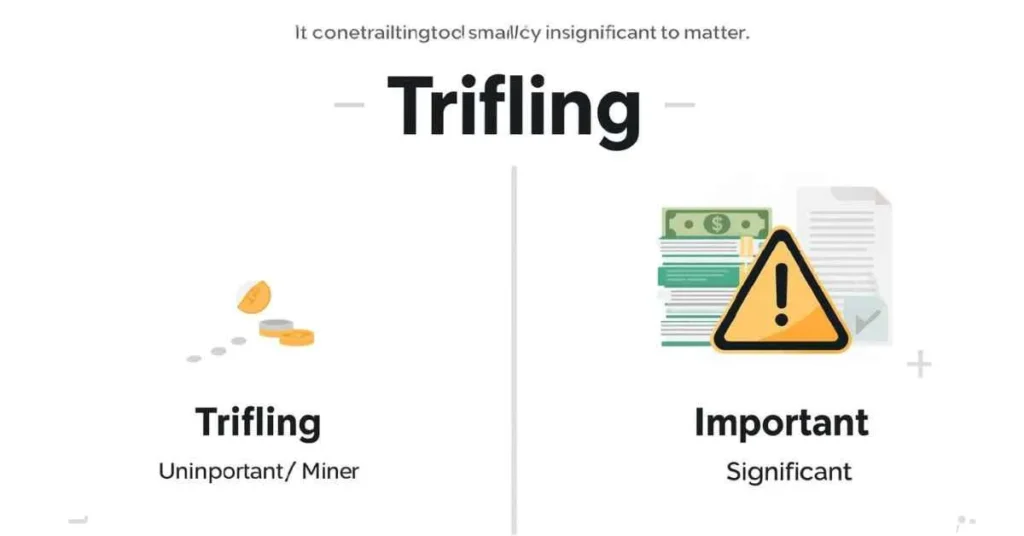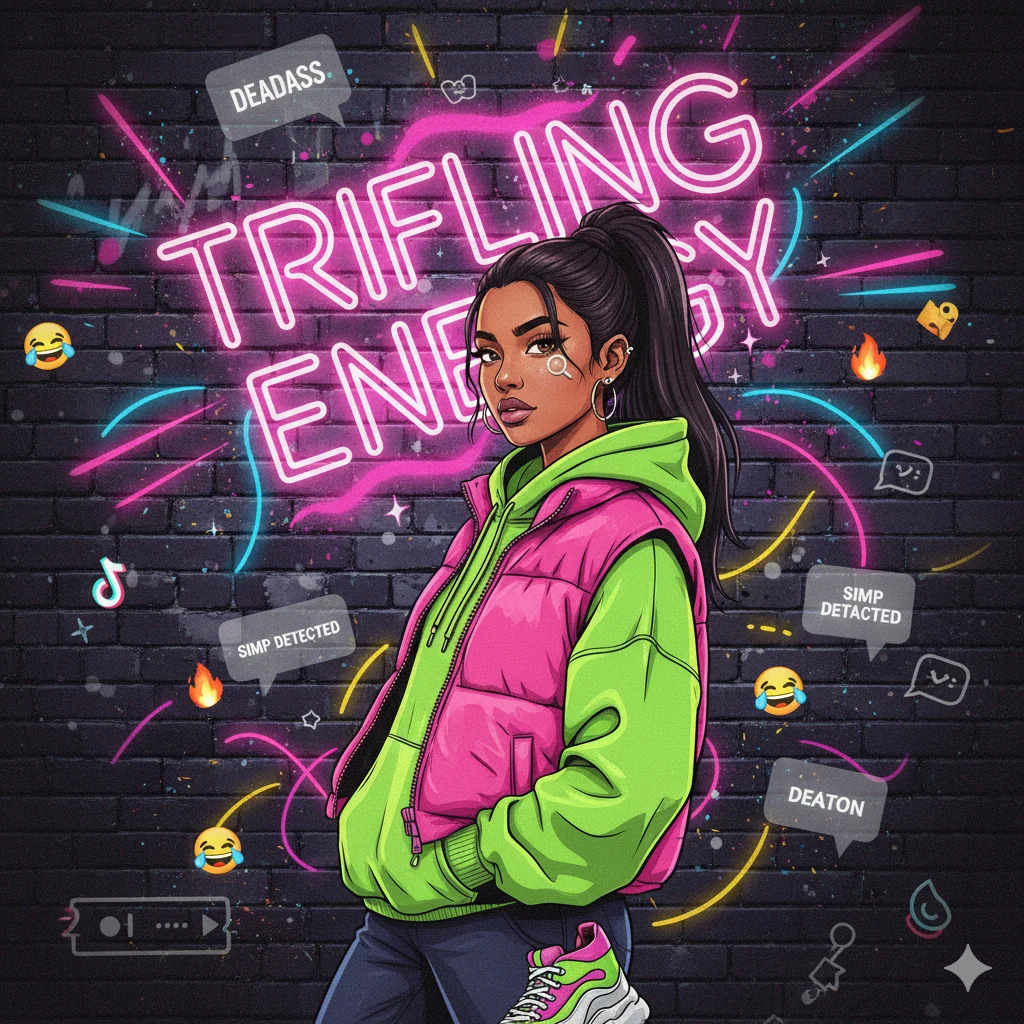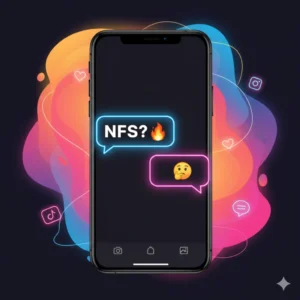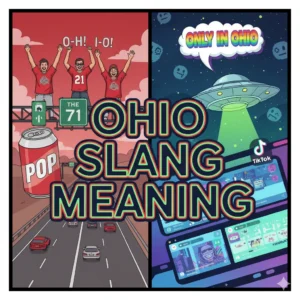In today’s world of social media slang and viral trends, words don’t just describe people — they define entire attitudes. One word that’s making noise across TikTok, Twitter (X), and Instagram is “Trifling Meaning.”
You’ve probably seen someone tweet, “He’s so trifling,” or heard a friend complain, “She’s acting trifling again.” It’s a word filled with frustration, shade, and humor all at once. But what does “trifling” really mean in slang?
Let’s break down the real meaning of trifling, how it evolved from old English roots to modern online slang, and why it’s become one of the most expressive ways to call someone fake, lazy, or unreliable.
What Does Trifling Mean?

Trifling means something very small, unimportant, or not worth serious attention. When you call an issue, amount, or action “trifling,” you’re saying it has little value, impact, or significance—often so minor it doesn’t deserve concern.
Simple Definition
- Trifling (adjective): Too small or insignificant to matter; trivial.
How the Word Is Commonly Used
- Money: A trifling amount of cash = a very small sum.
- Issues: A trifling matter = a minor problem that doesn’t need much effort.
- Behavior (older/literary use): Someone trifling may be acting lightly or wasting time on unimportant things.
Synonyms (for Context & SEO Variety)
- Trivial
- Insignificant
- Minor
- Petty
- Inconsequential
Example Sentences
- The delay was trifling and didn’t affect the final result.
- He dismissed the complaint as a trifling issue.
- Compared to the total cost, the fee was trifling.
Tone & Nuance
“Trifling” often carries a slightly dismissive tone, implying that something shouldn’t be taken seriously. It’s neutral in modern usage but can sound formal or literary depending on context.
Quick takeaway: If it’s trifling, it’s too small to matter—easy to ignore and rarely worth debate.
What Does Trifling Mean in Slang?
In slang, “trifling” refers to someone who is lazy, deceitful, or fake — someone who doesn’t care enough to be honest, respectful, or reliable. It’s a way of saying, “You’re not serious,” or “You’re wasting everyone’s time.”
When someone says, “Don’t be trifling,” they mean:
👉 Stop playing games.
👉 Stop pretending to care.
👉 Start being real.
Unlike generic insults, “trifling” carries emotional weight. It implies not only laziness or unreliability but also a lack of moral depth. You can act trifling in a relationship, at work, or even as a friend — it’s all about not living up to basic decency.
Example:

- “She didn’t even text back after making plans — that’s trifling.”
- “He lies about everything. Straight up trifling behavior.”
The power of the word lies in its tone — a mix of annoyance, disappointment, and truth.
Origin and Evolution of Trifling
The word “trifling” isn’t new at all. It actually dates back to the 1300s, coming from the Old French word trufler, meaning “to speak nonsense or jest.” In Old English, “trifle” meant something unimportant or without value.
But in the 1900s, the word found new life in African American Vernacular English (AAVE). In Black southern communities, “trifling” evolved to describe someone lazy, disrespectful, or good-for-nothing. It appeared in blues songs, sermons, and comedy routines — a cultural way to call someone out for being unreliable or fake.
Over time, pop culture, especially hip-hop, R&B, and online slang, brought “trifling” into mainstream language. Now, it’s used by everyone from Gen Z TikTokers to Twitter users venting about fake people.
So while the word has ancient roots, its modern slang meaning was shaped by cultural storytelling and lived experience.
Trifling Meaning in Relationships
In relationships, “trifling” is one of the most emotional slang terms you can use. When someone calls their ex or partner “trifling,” they’re expressing deep disappointment — usually after being lied to, ignored, or manipulated.
Examples:

- A boyfriend who flirts online while pretending to be loyal.
- A partner who never helps, never apologizes, but always plays the victim.
- A friend who uses you when they need something and disappears afterward.
Calling someone trifling is like saying, “You showed me who you really are — and I’m done.”
In love and friendship, trifling people drain energy and destroy trust. That’s why the word resonates so strongly; it captures heartbreak in a single, sharp phrase.
Trifling in African American Vernacular English (AAVE)
To truly understand the depth of the term, we must recognize its AAVE origins. Within African American communities, “trifling” has long been used as both criticism and social commentary.
It can describe individuals —
👉 “He’s too trifling to get a job.”
👉 “She’s trifling for leaving her kids like that.”
Or it can describe institutions —
👉 “These trifling landlords don’t fix anything.”
In AAVE, the word carries moral and cultural weight. It doesn’t just label laziness; it calls out people (or systems) that lack integrity and accountability.
This is why “trifling” has survived for centuries — it adapts to fit both humor and truth.
Trifling in Pop Culture and Music
From blues singers to TikTok influencers, “trifling” has always had a home in entertainment.
🎵 Erykah Badu famously sang about “trifling men” in her soulful tracks.
🎵 Destiny’s Child called out “trifling, good-for-nothing type of brothers” in their hit “Bills, Bills, Bills.”
🎵 On TikTok, users post skits with captions like “When your man acts trifling and you pretend not to care.”
In pop culture, “trifling” has evolved into a badge of self-respect — a way to laugh at red flags and reclaim power.
These references give the word authority and depth. They show how language born from pain can become a tool of empowerment and humor.
Trifling vs. Petty: Know the Difference
“Trifling” and “petty” are often confused, but they mean very different things.
| Term | Meaning | Example |
|---|---|---|
| Trifling | Lazy, dishonest, or insincere — lacking depth or effort. | “He said he’d help but never showed up. So trifling.” |
| Petty | Overly concerned with small, trivial issues. | “She blocked me for liking someone’s post. So petty.” |
👉 Trifling is about lack of integrity.
👉 Petty is about overreacting to small things.
Both can be negative, but trifling hits harder because it challenges someone’s character, not just their attitude.
Trifling Behavior on Social Media
The internet has made “trifling” a meme-worthy term. It’s used to describe fake online personas and hypocritical posts — people pretending to live perfect lives while doing messy things offline.
Examples you’ll see in memes:

- “Posting quotes about loyalty while cheating IRL — trifling.”
- “Saying you’re busy but always online — trifling.”
- “Acting like a victim after being exposed — next level trifling.”
These memes blend truth with comedy, letting users call out fake behavior in a relatable way. They show that humor is one of the internet’s favorite coping tools — especially for emotional situations.
Trifling Friends: When Loyalty Turns One Sided
Friendship drama often brings out the word “trifling.” When someone says “She’s trifling,” it usually means betrayal, jealousy, or lack of effort.
It can mean:
- Breaking promises.
- Talking behind someone’s back.
- Using a friend for attention or help but never giving the same in return.
In friendships, “trifling” hurts because it’s personal — it signals that trust and loyalty have been broken.
So next time someone acts shady or unreliable, you’ll know exactly what to call it.
Emotional Power of the Word Trifling
Why does this one word sting so much? Because it’s more than an insult — it’s a summary of emotional disappointment.
When you call someone trifling, you’re saying:
- You wasted my time.
- You weren’t real.
- You didn’t care when you should have.
It’s the perfect term for when you’ve moved past anger and just see the truth. The emotional power behind “trifling” makes it one of the few slang words that’s both funny and cathartic.
How to Avoid Being Trifling
Believe it or not, the rise of this slang word has also made people self-aware. “Trying not to be trifling” has become a lighthearted trend online, symbolizing personal growth and accountability.
Here’s how not to be trifling:
✅ Keep your word.
✅ Respect people’s time.
✅ Be honest about your intentions.
✅ Admit mistakes instead of hiding them.
✅ Be genuine, not performative.
In a world full of pretense, being authentic is the best way to avoid being trifling.
Why Trifling Has Lasted So Long
Most slang fades in a few years, but “trifling” has survived for centuries — and that’s rare. Why? Because it’s emotionally universal.
No matter where you’re from, everyone has met a trifling person — someone who promises much and delivers nothing. That shared experience gives the word timeless relevance.
From 14th-century literature to 21st-century memes, “trifling” proves that language is not just about communication — it’s about expressing human truth.
FAQs About Trifling Slang
Q1: What does trifling mean in slang?
It means someone who is lazy, fake, or untrustworthy — someone who acts like they care but doesn’t put in effort.
Q2: Is “trifling” a bad word?
It’s not profanity, but it’s an insult. It criticizes behavior, not appearance, and often points to dishonesty or irresponsibility.
Q3: Where did “trifling” slang originate?
It evolved through African American Vernacular English (AAVE), rooted in southern Black speech, and spread through music, comedy, and internet culture.
Q4: What’s the difference between trifling and petty?
“Trifling” questions a person’s integrity; “petty” mocks their small-mindedness. Both can overlap, but trifling is heavier.
Q5: Why do people say Don’t be trifling?
It’s a warning or reminder — don’t act fake, lazy, or disrespectful. Be better than that.
Glossary of Related Slang
| Slang Word | Meaning | Example |
|---|---|---|
| Petty | Overly dramatic about minor issues. | “He’s petty for blocking me over a meme.” |
| Salty | Bitter or upset. | “She’s salty because I got promoted.” |
| Shady | Acting suspicious or untrustworthy. | “That was a shady move.” |
| Cap / No Cap | Lying or telling the truth. | “That’s cap — you didn’t do that!” |
| Ghosting | Disappearing without explanation. | “He ghosted me after one date — trifling.” |
Adding these related terms helps readers explore the slang world more deeply — and strengthens your article’s SEO topic coverage.
Conclusion: The Real Meaning Behind Trifling
“Trifling” isn’t just another viral slang word — it’s a cultural reflection of disappointment, authenticity, and humor. It’s how people describe those who waste time, play games, or lack self-awareness.
From early blues lyrics to TikTok memes, it’s stayed relevant because it’s real. Everyone has been trifling at some point, and everyone has dealt with trifling people — that’s what makes it relatable.
So next time you see someone acting fake, unreliable, or careless, you’ll know the perfect word to describe them. But more importantly — you’ll remember not to be one of them.




